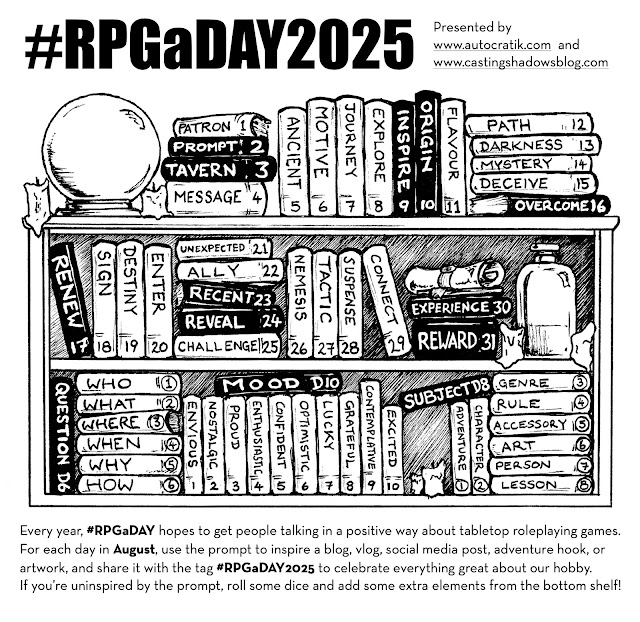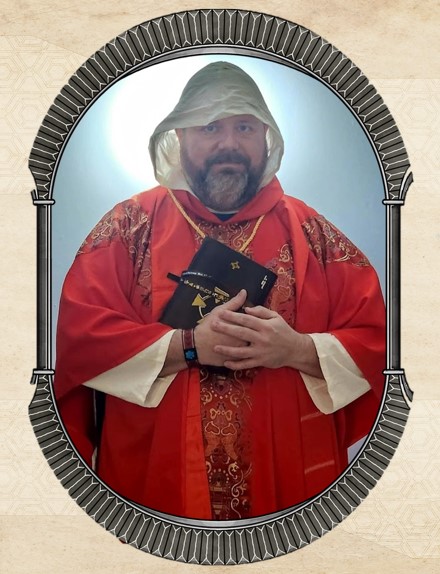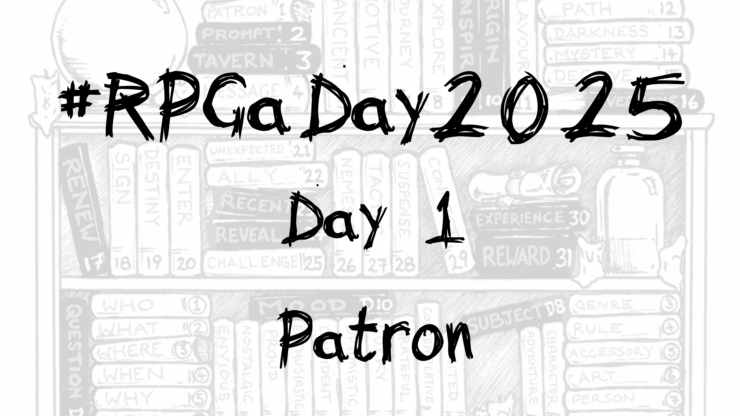Here we go! Day 1 of RPG a Day 2025

The prompt for today is Patron. Merriam Webster’s definition is here, but of the various meanings, let’s use this one: a “person chosen, named, or honored as a special guardian, protector, or supporter.” I think that’s a helpful definition for how patrons are used in role-playing games.
Beyond the very literal Patron of a Warlock in D&D, patrons are a handy tool in a Game Master’s (GM) toolbox. They serve as quest givers and advisors to characters, and can be recurring NPCs or even potential antagonists. They can be authority figures, supporting or undermining the player’s plans. They can sometimes serve as the GM’s mouthpiece, cautioning against ill-conceived plans or making the information dump more palatable in conversation with the patron. They can offer handrails to new characters by guiding them on how the game’s mechanics work, or provide backing and support to those who may lack the power or influence to achieve their initial goals in the campaign world.
Patrons are preferable to casual, one-off quest givers because they are often recurring non-player characters (NPCs) that create familiarity and bonds for the players and their characters. They can also have hidden agendas that may or may not align with the players. If they become allies, mentors, or friends to the characters, they can be great hostages or even sacrificial pawns for the emotional denouement.
I’ve used patrons heavily throughout my campaigns. I started to think back, and here are some of my favorite patrons I’ve used in the past:
- A cryptic wizard, who is the soul of a dragon trapped in a mortal body, sends the adventurers on quests and returns to guide them in their quest to save the world. He was the patron of my first long-term campaign in the late 80s. I’ve reused him, as I’ve run three versions of the campaign. The second time around, one of my players hated his holier-than-thou attitude, so the third time around, he was a more sympathetic and accessible mentor, and I’d say that was the most successful version.
- A wizened scholar and his daughter hire the adventurers to find a relic. Still, he quickly becomes a liability to the characters, as he and his daughter are kidnapped and rescued multiple times.
- The all-powerful god is hidden in the body of the comic relief NPCs. This one began as a riff on Rafiki of The Lion King, but took on a life of its own.
- An ancient, wise, and not-evil Beholder who created a secret society to protect the kingdom. He is one of my favorite patrons, secretive, unexpected, challenging the player’s preconceptions. He never betrayed the characters, but his servant turned out to be the big bad guy of the campaign.
- In my current campaigns, a mash-up of the Fading Suns setting and the Savage Worlds rules, which we, very originally, call Savage Fading Suns, the patron was a priest of the Orthodox sect of the Universal Church of the Celestial Sun. He gave them their missions, helped them at the beginning of the game, and now he has fallen on hard times and may need their help to escape his ultimate fate! (A little sneak peek for my players who may be reading this.)

For that last patron, I did one of the things I’ve enjoyed the most in recent years. I dressed up as the NPC and delivered the introduction to the first adventure in character. Only the second time I’ve ever cosplayed as a GM in my campaigns!
As an aside, who has been my patron in real life? Who made it possible for me to enjoy this hobby for 39 years? I’d said my patrons, my greatest supporters, were my family, who bought the books, who encouraged me, who welcomed my friends to play at our house, and cooked for us. I am eternally grateful to them for their support all through the years.
What do you think? Are Patrons a valuable tool for GMs? Are they overused? How do you use them?
Leave your thoughts in the comments, or tag me in your replies, wherever you make them. If you choose to participate, don’t forget to tag your participation with the #RPGaDay2025 hashtag so the community at large can find your posts.


I particularly like the part where you share about your own gaming patrons. Nice~
Thank you!
Muy buen artículo. Encaja perfecto con lo que yo también estaba pensando.
Creo que usaré tu traducción para practicar más mi español.
¡De verdad que necesito practicar más!
Excelente